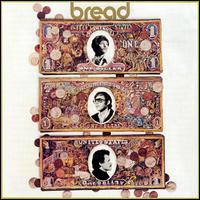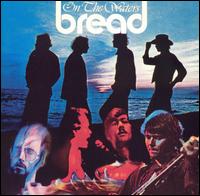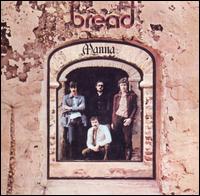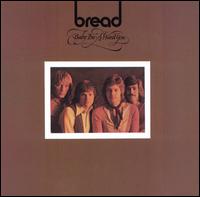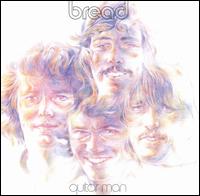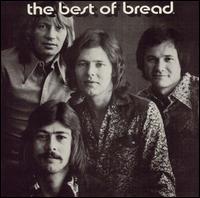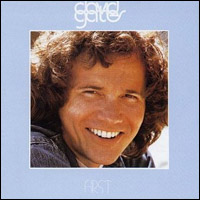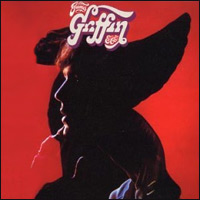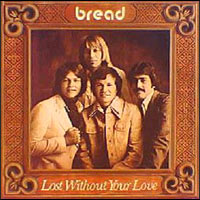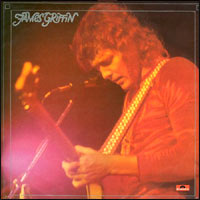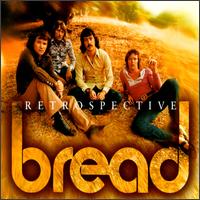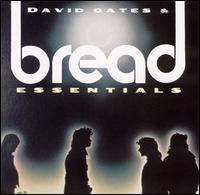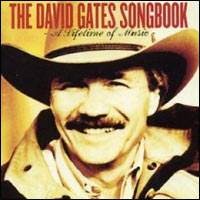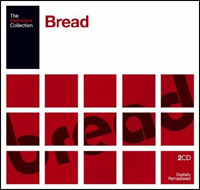Randy's Rodeo
music that rocks, rolls, swings, and twangs
| Artist Index | Song Index | Radio | Home |
|
Music Reviews Special Features Information Support Me |
Sock it to me, Santa!
James Griffin's biggest individual success, in fact, was "For All We Know," a song he cowrote with fellow Bread player Robb Royer for the movie Lovers And Other Strangers (1970). The song won an Oscar, but it became a runaway smash hit (and perennial slow dance request) only when covered by that other pillar of 70's soft rock, the Carpenters. Jeez, Jimmy Griffin couldn't catch a break - even when he wrote a hit he didn't have a hit.... Regardless, one inescapable conclusion one draws from listening to Bread's records is that Griffin was - however unheralded - pretty damn good. His pithy, organic songs and his brusque tenor provided a refreshing counterpoint to Gates' doe-eyed melancholy. In a way, Griffin played Keith against Gates' Mick, ever the rocker (relatively speaking) in a band dominated by an unrepentant pop star. Truth be told, James Griffin really was pissed off - for a while, at least. As Bread grew more successful, he sunk into substance abuse. When the band began to splinter, he sued the crap out of them to prevent them from carrying on as "David Gates & Bread." Ultimately, Griffin cleaned up and, by all accounts, was a prince of a guy - equally devoted to his friends, his family, and the music that sustained him. Moreover, he made peace with his unwilling role as second fiddle in one of the world's most famous bands. He even covered David Gates' "Everything I Own" - beautifully, I might add. But, I get ahead of myself.... [close]
For his part, James Griffin chiseled a rough-hewn facet into Bread's well-polished music. But, he went largely ignored at the time and, like most second fiddles and flipsides, has been virtually forgotten. According to Griffin, he and Gates initially agreed to split the limelight, alternating singles between songs on which each took the lead. After Gates' initial successes, this arrangement fell through, and Griffin's understandable frustration eventually boiled over. Tensions between Gates and Griffin led to Bread's initial 1973 breakup following the release of Guitar Man (1972). The group briefly reunited in 1976 for one final album (Lost Without Your Love) and tour, then Gates began touring with a reconstituted version of the group. Griffin soon filed those lawsuits that prevented Gates from using the group name - and tying up the band's royalties until much later.
Gates also recorded a number of surf records. One, a vocal novelty called "The Okie Surfer" (1963), poked less-than-gentle fun at David's Sooner State upbringing. Bob Keene's Del-Fi label released the record under the pseudonym 'The Country Boys' (see The Del-Fi & Donna Story or Del-Fi Beach Party!). The same year, Gates played bass on a Warner Brothers album called Ski Surfin' credited to 'The Avalanches.' The nearly anonymous band included other soon-to-be-famous session men such as guitarists Billy Strange and Tommy Tedesco and drummer Hal Blaine, and they performed winter-themed songs in an instrumental surf idiom.
Reflecting on his early days, David Gates told writer Barney Hoskyns, "Seeing some nice songs go down the drain, you started to think, maybe I ought to do them myself." So fate sparked when James Griffin began collaborating with Robb Royer, a singer-songwriter whose group The Pleasure Faire was produced by Gates. The trio of starving musicians - Gates, Griffin, and Royer - immediately hit it off. Tired of tending the careers of other artists while their own lay fallow, they began to conspire, hoping to spotlight their own compositions and considerable performing talents.
For On The Waters (1970), Bread added a full-time drummer, Mike Botts. The California native was a well-known session man (having anchored bands for jazzbos Wes Montgomery and Jimmy Smith, plus former Righteous Brother Bill Medley) and had belonged to his own group, the Travelers Three, in the mid-60's. Botts' strong, stalwart drumming - combined with more seasoned, confident contributions from the songwriters - raised Bread's sophomore platter a discernable notch above their debut. Among the highlights were Gates' "Blue Satin Pillow," a gutsy garage rocker, and Griffin and Royer's "Look What You've Done," a propulsive ballad with a soaring, ambitious arrangement.
The growing disparity between Bread's image of themselves as serious rock musicians and the public's perception of them as sweet balladeers was thrown into stark contrast with their third album, Manna (1971). Royer and Griffin wrote a number of fine rockers, and David Gates contributed the smoldering "Let Your Love Go," Manna's lead single. While that song stalled at #28, the follow-up, Gates' tender, poetic ballad "If," shot to #4 and ultimately becames the band's signature song. With tension building, Robb Royer soon departed, though he continued writing with Griffin. Ultimately, though, the loss of this founding member proved to be a good thing for the group. Royer's replacement was Larry Knechtel, a studio pro with a bulging resumé, including a stint in Phil Spector's legendary Wrecking Crew. Known primarily as a pianist (that's him playing the stately introduction to Simon & Garfunkel's "Bridge Over Troubled Water"), Knechtel could handle a number of instruments with equal aplomb (including bass on the Byrds' "Mr. Tambourine Man").
But, to the average radio listener, Baby I'm A-Want You was just another batch of sweet Bread ballads. "Mother Freedom," the loudest song Bread would ever record or Gates would ever write, had been released as an advance single during the preceding summer, but it barely breached the Top 40. Elektra then released the title song - a virtual rewrite of "Make It With You" - and it predictably shot to #3. This single was followed with two more Gates ballads, "Everything I Own" (#5) and "Diary" (#15). Make no mistake: As soft rock ballads go, these are among the best, and Gates' craftsmanship is impeccable. "Everything I Own," in particular, is really a gem; originally a tribute to Gates' father, the song is, at its core, an emotionally bald plea for rapprochement. Thanks to this universal appeal, "Everything I Own" has been covered over the years by reggae singer Ken Boothe, Culture Club diva Boy George, indie popper Chris Von Sneidern, and boy band N'SYNC.
Nevertheless, Bread soldiered on, quickly releasing a new single with David Gates' "The Guitar Man" (1972). Quite unlike anything in the group's canon, "The Guitar Man" is atypical in a number of ways: most fundamentally, it's not a love song. But also, "The Guitar Man" (as the name suggests) emphasizes the rich interplay of six-strings as much as the melody and lyrics. Starting with the sweeping steel guitar introduction, then punctuated with Larry Knechtel's stinging leads, the song tells the story of a journeyman musician driven to perform - a story familiar to the veterans who comprised Bread. The album that followed was certainly less spectacular than Baby I'm A-Want You, though strong by most standards. "Fancy Dancer," a swamp rocker written by Griffin with drummer Botts, and another Gates-Griffin collaboration, "Make It By Yourself," were standout tracks. The subsequent singles, "Sweet Surrender" and "Aubry," though, showcased yet more Gates' balladry.
Whatever, David Gates and Jimmy Griffin soon leapt into the fray with solo records, though both enlisted the talents of Mike Botts and Larry Knechtel. Gates' initial LP, First (1973), was pretty terrific, surveying country ("I Use The Soap"), jazz ("Lorilee"), and rock ("Sunday Rider") with casual assurance. The first single, "Clouds," was part of an impressive extended suite, but on its own conformed roughly to the public's idea of a standard Gates ballad. Nevertheless, the song stalled at #47, and the follow-up ("Sail Around The World") limped to #50. The album failed to even dent the Top 100. James Griffin soon began recording another album with a familiar cast of supporting players - Botts, Knechtel, and studio stars like Jim Gordon, David Paich, and Dean Parks. David Gates even showed up to contribute bass to one track, "That's All I Need," making it another unofficial Bread reunion. The album, simply titled James Griffin, was scheduled for release in 1975, but when the lead single - a horn-driven rocker called "Treat Her Right" backed with a superb ballad, "How Do You Say Goodbye" - flopped unceremoniously, the project was shelved, and Griffin slipped into the background. The album finally came out in Europe in 1977, and in 2013, a small English label called Hux compiled both of Griffin's early solo albums as Just Like Yesterday: The Solo Anthology 1974-77. David Gates next record, Never Let Her Go (1975), simply reiterated - with slightly diminished results - the eclectic formula of First. Still, it fared better in the marketplace, spawning one Top 30 single with the title track and another when Gladys Knight & The Pips promptly covered "Part Time Love." Mike Botts, meanwhile, landed a plum gig drumming for Linda Ronstadt, touring and contributing to such records as Hasten Down The Wind (1976). In later years, Botts worked with Dan Fogelberg, Andrew Gold, and Eric Carmen, and in 2002 he released his first-ever solo album, Adults Only (available through CDBaby). Larry Knechtel simply resumed his illustrious session career, lending support over the years to Jerry Garcia, Elvis Costello, and many others. Also, Knechtel recorded several instrumental albums, including Mountain Moods (1989) and Urban Gypsy (1990).
As always, however, Griffin's songs languished as LP cuts or single b-sides while the Gates ballads played out on the charts. David Gates' best cut on the record, the jazzy ode "The Chosen One," was ignored in favor of pleasant piffle like "Hooked On You." Bread toured in support of the record, but, in Gates' own words, "It was worth a try, but once was enough." Tellingly, Lost Without Your Love was unavailable in any format for many years, and unlike Bread's other LP's was never reissued on CD by Elektra. (The album was finally reissued in 2006 without aplomb by little Wounded Bird Records, along with three other then-deleted Bread albums).
In and of itself, though, Gates' early solo work was never issued on CD in the United States until 2008, when Wounded Bird released his first four albums - First (1973), Never Let Her Go (1975), The Goodbye Girl (1978), and Falling In Love Again (1980). Shortly thereafter, English label Edsel reissued all four titles together in a two-disc set - highly recommended. As for Griffin, after his self-titled second solo LP was finally released, he resumed writing songs for other artists. He also cut an LP, Griffin & Sylvester (1982), with Hollies' lead singer Terry Sylvester. In the late 80's, Griffin collaborated with fellow semi-legends Billy Swan ("I Can Help") and Randy Meisner (the Eagles) in a group called Black Tie, recording one album, When The Night Falls (1985). When the album was reissued in 1990, the group landed a minor country hit with a rendition of Buddy Holly's "Learning The Game." Soon thereafter, Jimmy Griffin earned his biggest post-Bread success with the Remingtons, a country trio. The group scored a Top 10 country single ("A Long Time Ago") on their 1991 debut, Blue Frontier, then waxed an interpretation of David Gates' "Everything I Own" - extending an olive branch, perhaps? - for their album second album, Aim For The Heart (1993). Olive branch or not, Bread finally settled the lawsuits and mended the fences for a reunion tour in 1996. According to their biographer, Malcolm Searles, Gates demanded half the proceeds - and Jimmy Griffin acceded. While it ended up an amicable and profitable venture, nothing further came of it - though Griffin, Botts, and Knechtel would perform the occasional gig billed as Toast!
Even better, though, is Rhino's earlier Retrospective (1996), a 2-CD, 50-song treasure trove with nearly every essential Bread song (see below), including several solo tracks and Griffin's never-released demo of "For All We Know." In that light, Rhino's 2-CD, 30-song Definitive Collection (2006) doesn't live up to it's name. Really, it's just a slimmed-down version of Retrospective, edited liner notes included. But, 30 songs for less than $20 - that's a definitive bargain, at least. Avoid, however, Elektra's 20-song Anthology (1990); ancient by CD standards, it inexcusably omits "Mother Freedom," Bread's most convincing rocker. During 2005, tragically and improbably, fully half of Bread passed away. First, James Griffin succumbed to lung cancer in January, and then Mike Botts fell victim to colon cancer in December. Both were just 61 years old. As the year closed, UK label Lemon Records released a previously unheard Griffin album, Break and Run, and in 2010 Robb Royer compiled Jimmy Griffin, a collection of unreleased recordings dating back as far as the 1970's. One could only hope that Griffin's and Botts' sad, premature deaths (followed by Larry Knechtel's passing in 2009) would trigger a long-overdue reassessment of Bread's music. To date, that hasn't happened, and you shouldn't hold your breath - though the band's popularity in England and Asia has proved durable. True, Bread excelled at sentimental ballads and sold a truckload of records, but they were neither the kings of soft rock schmaltz nor the money-grubbing opportunists the rock press portrayed them as. Rather, they just a rock band, a good and sincere group of professional musicians who captured our young hearts. Listen to their music with open ears, and relive the unblinking magic of all those wonderful, charming hits. But, listen to Jimmy's songs, too.... [top of page]
Your witty comments, impertinent questions, helpful suggestions, and angry denials are altogether encouraged. Submit feedback via email; submissions will be edited and posted at my discretion. August 27, 2006. I came upon your website by inquiring about what happened to the members of Bread. I am sorry to learn that two of the members have passed away. Although I was a young woman in the Seventies and listened to their music, I honestly didn't pay much attention to it and never bought one of their albums. One day not long ago I was driving along listening to the radio, and the song "Make It With You" was playing. I was just overwhelmed by the beauty of the words as well as the music and delivery. I proceeded to find out who was singing this beautiful song and discovered it was Bread. I bought their album The Best Of Bread at the local Goodwill store. As I played it, I remembered most of the songs, but I had never realized how beautiful they are. They are pure poetry, and the images are unbelievable. I am so glad I rediscovered such a talented group now that I am in my sixties. I was hoping a comeback would be possible. I enjoyed reading your article. Also, my twenty-year-old cousin loves their music. She also purchased a copy of The Best Of Bread at the Goodwill store. Mine will never end up there. I treasure it. - Jacqueline [close] November 19, 2005. Now that I have internet, I wanted to pass on thanks to David Gates and Bread for the music that will always be a part of my life. I am sad that some of them are already gone. Their music can be the spotlight or play forever in the background and never provoke any complaints. It is the music that's important. Please tell any or all survivors of Bread of my admiration. Thanks again. - Al DuVall April 17, 2005. I just finished reading your wonderful article about Bread. I would like to say thanks, I feel it was a very honest assessment of the group. I must also say thanks for giving James the credit he deserved... kudos for doing that! It's heartbreaking that James passed before he had a chance to receive and enjoy the credit he was due. My name is Holly Cieri, and I was a friend of James Griffin. I believed in him so much, words could never express what I feel about James as a musician and as a person! I'm a new artist trying to make my own mark on the music world. I could go into more detail about the "dream come true" of meeting James and recording a duet of For All We Know with him a few months before cancer cruelly took him away, but it's all on my website if you ever feel like checking it out - www.hollycieri.com. My whole reason for wanting to work with James - beyond the obvious that I think
he's a great (unsung) musician and a really sweet person - was I wanted to see him
finally step out in front and get the recognition he deserved, as much as I wanted
to see the start of my own career. That's how much he meant to me! |
|
|||||||||
Navigation Artist Index Song Index Randy's Radio Home Top Of Page Music Reviews Alternative Blues Books Christmas Classic Rock Country Jazz Lounge Special Features History Of Randy's Rodeo Sex Pistols Motown Records Halloween Valentine's Day Information About Me Feedback Links User's Guide Support Me Amazon iTunes Sheet Music Plus © 1999-2025 Randall Anthony, www.hipchristmas.com and www.randysrodeo.com |
|||||||||||

